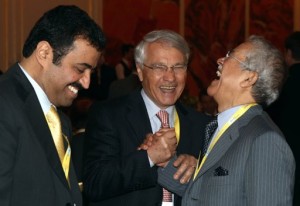If we can get your attention off Dred Scott II — the Supreme Court decision on health care costs with its byzantine political implications — something perhaps as fundamental for the U.S. and world economies is happening: a second fossil fuel revolution.
The Saudis are pumping oil like mad. The world’s swing producer, Saudi is at a three-decades record production level and has passed Russia as No. 1 exporter.
Satiated momentarily with huge profits from high world prices earlier this year, Saudi decision-makers are playing high-stakes poker. We may even be moving into a generation with semi-technocratic Saudi rulers who realize they have a diminishing asset in their underground reserves.

Whatever, they are flouting OPEC quotas — which, in any case, would inevitably be trashed by such notoriously honest game players as Venezuela’s Hugo Chavez and the Teheran mullahs suffering sanctions on direct exports.
The loudest whimpers already are coming from Russia. Lower prices are crippling Russia at a time when its economy increasingly depends on fossil fuel exports.
At a recent St. Petersburg meeting on the economy, President Vladimir Putin talked reorganization and new foreign investment in his decrepit gas industry and his so-far abortive search for Arctic oil. That comes after his little game with corrupt German leadership to skirt Baltic states’ transit fees and buy up European Union gas distribution is about played out.
Both the Saudis and the Russians face a weak market with the fall in consumption brought on by the staggering American economy, the Band-Aid fixes for the euro and a Chinese economy throttling down in slow motion.
If the Saudis continue to do their bit to depress world petroleum prices — even below real prices a decade ago calculated in inflation-wracked U.S. dollars — the big question is whether it’s good for America.
The Saudis, in leaks exaggerating their use of the oil weapon against Russia’s Mr. Putin for his continued opposition to their Sunni brothers in the Syrian morass, are also quietly aiming at America.
They have to be concerned whether the powerful North American petroleum industry, Republicans looking for jobs and a political weapon against President Obama, and the good sense of the American public are going to unleash domestic U.S. fossil fuel production.
Old T. Boone Pickens, the billionaire stereotypical Texas oil magnate, is a harbinger.
For a while there, he was a soldier in the Obama crusade shouting, “Alternative energy sources,” “Renewable energy,” “Green energy” and the whole ball of environmentalistas’ wax. Then it became apparent to all that solar subsidies were going down a bankruptcy black hole while Obama campaign supporters pocketed subsidies and Washington funded the importation of Chinese solar panels.
Everybody knows the wind blows hard in West Texas — nature’s own and human hot air.
But Mr. Pickens couldn’t solve how you get that wind power from the plains to urban centers without the enormous costs for new distribution networks and without creating a lawyers’ paradise in arguments over high-voltage access.
Even the environmentalistas found themselves on different sides of the arguments.
The Obama administration’s endorsement of high gas prices at the pump to drive all of us (pun intended) into nirvana through forced conservation was not exactly what was needed before the November election.
So now Mr. Pickens has jumped on the shale gas bandwagon.
He has recognized that with new technology, the U.S. may have more fossil fuel reserves than any other political entity. And, of course, gas meets some requirements (can anyone really satisfy all of them?) of environmental “constraints.”
So Mr. Pickens is now arguing — and this time he may be right — that switching truck and bus fleets to natural gas may not be all that expensive (with a little tax loophole here and there). And, he says, perhaps true, it would wipe out three-quarters of U.S. huge OPEC import bills in a decade or less.
Whether he has these figures any better arranged than his earlier wind-power arguments remains to be seen.
But with the “hidden” announcement that even the Obama administration finally is authorizing new Gulf of Mexico drilling, the Saudis obviously can’t take chances. So it is “Pump, habeebee, pump!” in Mecca-Jiddah.
Sol W. Sanders, (solsanders@cox.net), writes the ‘Follow the Money’ column for The Washington Times on the convergence of international politics, business and economics. He is also a contributing editor for WorldTribune.com and East-Asia-Intel.com.

